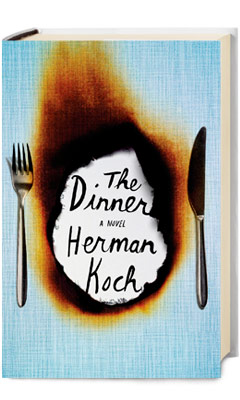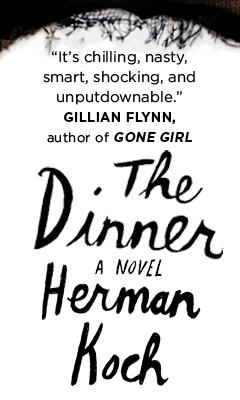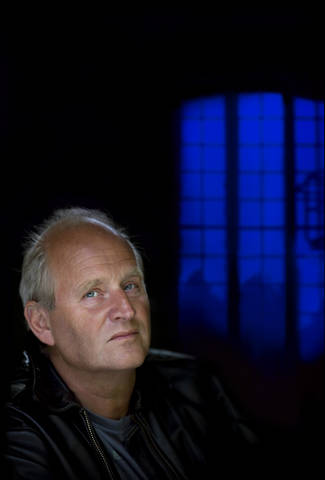The Dinner
by Herman Koch
The Dinner, the sixth novel from award-winning Dutch author Herman Koch and already a bestseller in Europe, arrives in the U.S. with an excellent translation and great deal of well-deserved advance praise. A slow-burn creeper, this suspenseful and unsettling novel turns a microscope on parenthood, exploring the knotty question of whether nature or nurture is the more powerful force in shaping our personalities and in the process, examines the darkness that may lie just below the thin veneer of civilization, social grace and propriety.
The novel begins innocently enough with our narrator, Paul Lohman, and his wife, Claire, preparing to meet his brother Serge and sister-in-law Babette for dinner at an upscale restaurant in Amsterdam. Paul is completely devoted to his wife and their teenage son, Michel, but is querulous and out of sorts; he hates the pretentiousness of the fancy restaurant experience, he's concerned about Michel's state of mind and he doesn't care for his brother, a local celebrity who is favored to become Prime Minister in Holland's upcoming election. Paul, a history teacher on leave, appears to be articulate and quite reasonable and at first it is easy to understand his discomfort. Serge, at least the way Paul presents him--as a hypocritical seeker of the limelight--does seem a bit of a preening narcissist, and Babette, dark glasses covering her eyes, seems cold and oddly distant. What's more, Paul's description of the annoying, fawning maître d' with a perpetually raised pinkie and his details of the fare (sun-dried tomatoes imported from Bulgaria, walnut shavings, and so forth) lead us immediately to the same conclusion as he about the ridiculousness of such a dining "experience." But somewhere between the appetizer and the main course, we begin to suspect that Paul may be that most slippery of guides--an unreliable narrator. His dislike of his obviously more charming and successful brother is unnecessarily venomous, as is his disdain for Babette (who, it turns out, is hiding eyes swollen from crying behind her dark glasses). By the time we discover that the purpose of the dinner is to discuss what to do about the sons of the two couples, who are the as-yet-unidentified perpetrators in a heinous act of violence, our suspicions are confirmed and we've no choice but to stay inside Paul's disturbed and increasingly disturbing mind.
 Paul reveals himself slowly over the course of the meal, alternating among the present, the immediate past and events that happened long ago. Through his keenly observed but elliptical descriptions of events, we learn that the reason for his extended leave from work is that he has a bit of an impulse control problem. At least this is how Paul frames the intermittent bursts of uncontrolled violence that have erupted from his ever-simmering internal rage. The cause, Paul explains, is biological (he won't disclose the exact disease, only that it is heritable) and he has been prescribed medication to treat it (whether or not he takes the medication is left for the reader to very quickly figure out). Unsurprisingly, Paul is emotionally disconnected from his own violent acts, describing them in gory detail but as if they were committed by another person. Yet he also manages to justify them in the same way he rationalizes his son's actions. In fact, the love for his son, who is shaping up to be quite the chip off the old block, is what underlies many of Paul's actions. It is no surprise then that Paul is willing to go to extremes to protect Michel. What is a surprise--in a novel that has many subtle, unnerving twists--is that he is not the only one.
Paul reveals himself slowly over the course of the meal, alternating among the present, the immediate past and events that happened long ago. Through his keenly observed but elliptical descriptions of events, we learn that the reason for his extended leave from work is that he has a bit of an impulse control problem. At least this is how Paul frames the intermittent bursts of uncontrolled violence that have erupted from his ever-simmering internal rage. The cause, Paul explains, is biological (he won't disclose the exact disease, only that it is heritable) and he has been prescribed medication to treat it (whether or not he takes the medication is left for the reader to very quickly figure out). Unsurprisingly, Paul is emotionally disconnected from his own violent acts, describing them in gory detail but as if they were committed by another person. Yet he also manages to justify them in the same way he rationalizes his son's actions. In fact, the love for his son, who is shaping up to be quite the chip off the old block, is what underlies many of Paul's actions. It is no surprise then that Paul is willing to go to extremes to protect Michel. What is a surprise--in a novel that has many subtle, unnerving twists--is that he is not the only one.
The unreliable narrator is a sturdy literary device but it takes a skilled writer to make it feel as fresh as Koch does here. As creepy as he is, Paul's sardonic (and sometimes bitingly funny) voice is compelling, at times even charming. You may know someone very much like Paul, Koch suggests. In fact, you may even be like Paul. After all, what caring parent wouldn't want to protect his or her child? This, Koch posits, is a natural--even a civilized response. Part of what makes the novel so taut and sinister is that Paul, and indeed all the characters, maintain the façade of propriety throughout the stuffy dinner (a metaphor for all of their carefully constructed and privileged lives) even as grotesquerie warps them from within. It is a further testament to Koch's talent that he is able to make such unlikable characters so interesting and relatable.
Throughout The Dinner, Herman Koch raises many questions about the nature of our bonds and values, both on a personal and on a societal level; yet he wisely leaves what might serve as answers to the reader. What he does do, definitively, is provide an immensely entertaining and absorbing novel that lingers--as tantalizing as the memory of a particularly satisfying meal. --Debra Ginsberg, author







